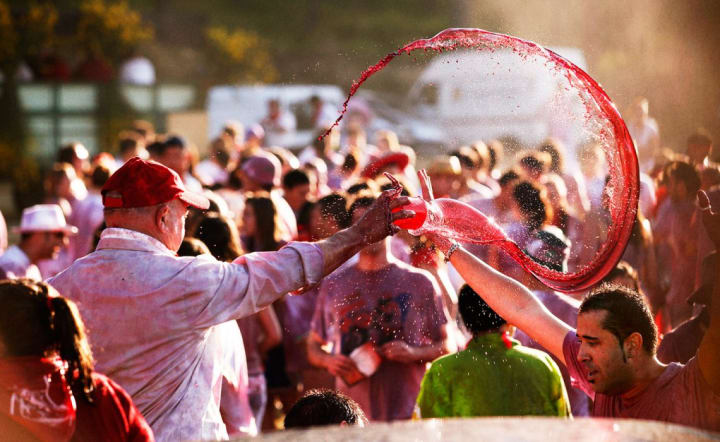The 10 Oldest Drinking Traditions in the World
Going out drinking for Thirsty Thursdays has nothing on the oldest drinking traditions in the world.

No one knows exactly when for sure, but seemingly since the dawn of time, people have found ways to get the party started. Drinking was more than just a means to numb the ever-present pain that is directly related to human existence, it was a way to share that pain with other people in a way that pulled a veil over the harsh realities of life at the time. Practices like this evolved over the course of centuries, becoming staples in societal practices to help celebrate, mourn, show reverence, and distinguish classes of people from others. These traditions, as many a sociologist might call them, have permeated the tale of humankind in many exciting ways, allowing people of today's day and age the ability to share with our ancestors something as pure and unadulterated as getting turnt. Unfortunately though, many an inebriated young person has raised their glass to cheer, but few have wondered why or how to do so properly. Thankfully for seasoned professionals like me (sorry, Mom), I have gotten drunk plenty of times and contemplated many a thing, including where and when this tradition came to be. Through my research, I have uncovered the oldest drinking traditions in the world, and intend to share with you what ancestral knowledge can be found at the bottom of the bottle (in no particular order whatsoever).
La Batalla del Vino

Source: A Wine Lover's Magazine
Wine connoisseurs and aficionados alike are all too familiar with the number of different regions of the world that are responsible for producing the nectar of the Gods, but few hold this most delicious of liquids in as high regard as those from a small town at the edge of Spain's Basque Country named Haro. Starting off as a land dispute in the 13th century, the people of Haro were forced to hold the line, so to speak, twice a year on Saint Peter's Day and the first Sunday of September. The people of Haro had to declare where their town's borders lay, or otherwise be absorbed into the neighboring territory of Miranda de Ebro. For 400 years this practice persisted, until one party or the other became fed up, and threw red wine into the air. Thus, La Batalla del Vino became an annual affair, taking place on June 29th. Locals gather at the base and up the length of a mountain, dosing tourists and themselves indiscriminately with buckets full of red wine until the day is done. Partying in the streets of Haro usually follows, lest you be condemned someone who cannot handle their alcohol!
Koupa
Dating back to the times of ancient Greece, exclusive to the island of Crete at the time, the drinking game called "koupa" is a sacred practice still held in high regard today. Though now more popular among bachelor and bachelorette parties than anyone else, the rules are relatively simple. One person should call on someone, and the person called upon should finish their drink, completing the deed by kissing the bottom of the glass. Now, faithful reader, you may be asking, "Oh orator of ancient libation practices, what comes next?" Allow me to share with you, dear readers, that the person in this situation who has just finished their glass will then call on someone else to finish their drink! The deed must again be sealed with a kiss to the bottom of the glass, and the game goes on and on until all patrons are so drunk that they start breaking dishware. Or something. That wasn't originally part of the tradition, but I digress...
Wedding Shenanigans

Source: Unsplash
Two European countries and one Asian county are to be praised for their strides in making peoples' big days just that much more enjoyable, and because the origins of these traditions are relatively unknown, I'll have to assume they're pretty far up there as the world's oldest drinking traditions are concerned.
In India, they have a little bit of fun at the groom's expense (literally) when playing Joota Chori. Basically, the women on the bride's side of the aisle do everything they can to steal the groom's shoes, which he has to pay a ransom for when him and his side of the family cannot find its hiding place and it's time to go home for the night.
In Ukraine, you're responsible for going after the bride's shoes, and there's also usually a price to pay for them to be returned. The successful thieves are expected to make "lighthearted" requests before the shoe is returned, and the most dreaded and frequent of these requests is to have the person retrieving the shoe to drink from it!
Finally, in Germany, thievery also plays a huge part in the tradition, though the stakes are much higher. The night before the big day, the groomsmen are to steal the bride and bring her to a bar where they begin racking up a tab. The groom is meant to find her before he is bankrupted from the ludicrous amount of drinking the groomsman commit themselves too before some such time. When he finally finds his beloved, he must square up with the bartender for the damage his men caused... after a round for the bar of course.
Medicinal Purposes
This is going to sound a lot like your cousin telling the family he smells like he was rolling round with a skunk because of his glaucoma, but these are surprising historical facts about drinking, not about the sticky-icky. In the times of the Pharaohs and the construction of the Great Pyramid of Giza, archeologists were able to find an impressive history with booze that would make the most hardened sailor shrink back in admiration. The ancient Egyptians boasted an impressive yield of the crop barley, and if you've ever been on a brewery tour, you already know how pivotal this ingredient is to the production of (most) beer. In fact, beer was their second most consumed beverage, behind only water, and was held in such high admiration that even children were allowed to drink it. Though thoroughly enjoyed among the population at large, beer was also used for medicinal purposes. This is a practice I adamantly subscribed to during my college years after particularly intense days at the gym, and I'd say this tradition is one worth keeping.
A Drink of Honey and Blood

Source: Bee Well Honey Farm
Hailing from the Serengeti, Tanzania has a celebratory drink traditionally served by the Maasai Warriors that would make most people living in first- and second-world countries sick to their stomachs; though, unless you wanted to insult the tribe at large, you'd be wise to drink it. Honey mead, as many professionals in the field of inebriation are already privy too, is the oldest known drink in human history. Therefore, it should really be no surprise that the majority of nomadic peoples wouldn't mind a drop of this sweet, sweet nectar every now and again. That said though, the Maasai Warriors up the ante by sticking a cow in the neck with a blunted arrow and collecting its blood before patching the beast up with dung. Then, they mix the blood into the honey wine, and well... you can probably guess the rest. Apparently the drink is incredibly sweet, a little syrupy, and makes your reflection invisible in a mirror or still body of water (just kidding, no vampires were created during the writing of this content). This is a celebratory drink though, so having the opportunity to participate in this ritual is an honor few people outside the Maasai have had the opportunity to try. At least we're past the days of turning up with hawthorn berries, I guess...
From Russia with Love
The Russians are a strong, stoic people, and their history is one filled with suffering and strife that highlight their ability to survive regardless of the odds. So, when considering the people walking the length of the Neva every day, it's probably no surprise to you, dear reader, that they drink vodka. Russian vodka. Neat. And since they take their alcohol consumption so seriously, you can imagine that their motivations for drinking are also taken very seriously. In fact, the practice has developed so much so that toasts are usually long affairs, commanding the tone that will set the standard of the night. These toasts also demand eye contact, or otherwise you will be insulting the orator of the occasion, as well as their audience.
One More for the Road

Source: Unsplash
Italy has many a spoken-word or implied tradition, and those are familial things we don't necessarily discuss with others. That said though, there's a couple of drinking traditions that stem from this part of the world that will have you better understanding the adage, "Chi non beve in compagnia o è un ladro è una spia;" or rather, "He who doesn’t drink in company is either a thief or a spy."
Having an already proud history for their cunning and their ability to size someone up, Italians have been known to frequent and host hole-in-the-wall establishments that will serve you roadside pints for your travels. That probably seems to some like it would be an all-day affair, but the point of moving things along should be your takeaway from this fact. Pay the man, enjoy your drink, and move on with your day. You can certainly see how information could be spread throughout town in very subtle ways with these kind of businesses surveying the lay of the land.
One other tradition is centered around the drink called autista and is specific to the island of Sicily. It is, historically, meant to serve as an instant shot of sobriety. Made with a plethora of ingredients, it is topped off with baking soda, and meant to be drank as quickly as possible to incite a bleach. That would, effectively (apparently) leave the drinker with a subdued drunk so that they could drive home. I'd like to think this is for quick getaways, but that doesn't seem all too old a tradition if that's the case; so I cannot, in good conscious, recommend trying this.
A Sign of Reverence and Respect
Asian culture is one that is particularly aware of showing reverence in almost every perceivable way, and it is so ingrained in their culture that the oldest drinking traditions in the world that come from the East are built around this virtue. In Japan, whenever you are pouring alcoholic beverages for the table, you must never fill your own glass and you must never fill a glass unless it is absolutely empty. Rest assured that everyone will make their rounds filling up glasses if they respect your friendship and the friendship of others at the table, and there will be many a good tiding as a result of this practice.
In Korea, they take this tradition a step further, pouring for the oldest members of the table first and working backwards, even turning their back to their elders when they raise their glass to their lips.
Pineapple Moonshine

Source: Wide Open Eats
Ah, moonshine. A pillar in America's drunken history and a testament to the fortitude of man. Thousands of years ago, the natives of the island recognized the many benefits of fermenting pineapples; and honestly, I couldn't be happier that they did. Think about it: Out of all the curious things you didn't know you could do with a pineapple, can you find any better way to lounge on the beach than with a hollowed out pineapple filled with pineapple moonshine? Just make sure somebody is there with you to apply sunscreen and flip you over every 20 minutes after you absolutely wreck yourself.
Shout
Spanning three continents, perhaps the oldest drinking traditions in the world are those that centric to being the most generous human being you can possibly be. Colloquially known as "shout" in Peru and Australia, and and simply being implied in England, somebody in the group buys the first round of alcoholic drinks for the table. And, similar to the way Japan's pouring system goes, a different person buys the next round. And the next and the next until everyone in your group has had their turn! If you don't do it, you're kind of considered a dick. You don't want to look like a dick, do you?






Comments
There are no comments for this story
Be the first to respond and start the conversation.